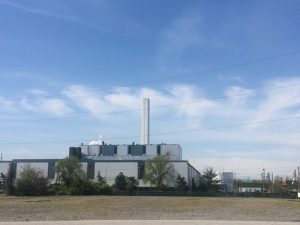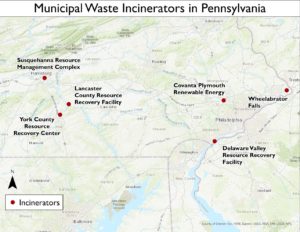
Trash Incinerators Will Reduce Nitrogen Oxides Emissions by Hundreds of Tons Per Year
Harrisburg, PA — In a major win for clean air advocates and public health, Pennsylvania on Friday finalized new regulations that will lower emissions of smog-forming pollutants from Pennsylvania’s six trash incinerators.
Advocates expect the action by the Pennsylvania Department of Environmental Protection (DEP) to reduce the nitrogen oxides (NOx) pollution that is allowed by a total of about 1,500 tons per year. This is pollution from three trash incinerators in the Philadelphia area and three in the Harrisburg area. NOx can trigger asthma attacks and contributes to the formation of particulate pollution, which is associated with premature death from heart and lung disease.
“The incinerator industry has long benefited from outdated air pollution limits that are far too high when technical assessments show that they can do better,” said Environmental Integrity Project Senior Attorney Leah Kelly. “We are glad to see Pennsylvania take this important step toward protecting public health, and we hope to see the U.S. EPA set stronger pollution standards for this sector soon.”
Joseph Minott, Executive Director for Clean Air Council, said: “These emissions reductions are an important step towards safeguarding clean air. However, emissions reductions alone are insufficient to protect environmental justice communities from the onslaught of pollution from trash incinerators. The DEP needs to seriously consider Zero waste and other alternative initiatives that sustainably address waste disposal and safeguard communities.”
In August 2021, the DEP initially proposed a state-wide rule tightening the default limit for daily average NOx concentrations from incinerators from 180 parts per million to 150 ppm. But after reviewing extensive comments from the Environmental Integrity Project and Clean Air Council, it ratcheted the limit down to 110 ppm, one of the most stringent NOx emissions standards in the country for existing incinerators.
EIP and Clean Air Council argued that there is a great deal of evidence indicating the state’s incinerators can meet a 110 parts per million limit, under a standard of the federal Clean Air Act called “Reasonably Available Control Technology.” Under federal law, state agencies must periodically assess whether major sources of NOx within the state can meet lower pollution limits under this standard. The new air pollution limits will go into effect on January 1, 2023, a deadline mandated by federal law.
Below is a list of the Pennsylvania incinerators comparing the old and new emission limits, as well as a map of their locations.
| Large Municipal Waste Combustors in Pennsylvania | |||
| Facility Name | County | Current NOx Pollution Limit (in parts per million, daily average) | New Default NOx Limit (in parts per million, daily average) |
| Covanta Plymouth Renewable Energy | Montgomery | 180 | 110 |
| Delaware Valley Resource Recovery Facility | Delaware | 180 | 110 |
| Lancaster County Resource Recovery Facility | Lancaster | 180 | 110 |
| Susquehanna Resource Management Complex | Dauphin | 135 | 110 |
| Wheelabrator Falls | Bucks | 150 | 110 |
| York County Resource Recovery Center | York | 165 | 110 |

Pennsylvania sets default limits, called “presumptive limits,” for whole sectors in which the owners of individual facilities either must meet the standards or demonstrate that they cannot meet them. Assessments have shown that the majority of municipal waste incinerators can comply with this standard.
For a copy of the new regulations, click here.
The Environmental Integrity Project is a 20-year-old nonprofit, nonpartisan organization, based in Washington, D.C., and Austin, TX, that is dedicated to enforcing environmental laws and strengthening policy to protect public health and the environment.
Clean Air Council is a member-supported, non-profit environmental organization dedicated to protecting everyone’s right to a healthy environment. The Council has offices in Philadelphia, Pittsburgh, and Wilmington, and works through public education, community advocacy, and government oversight to ensure enforcement of environmental laws. For more information, please visit www.cleanair.org
Media contact: Tom Pelton, Environmental Integrity Project (443) 510-2574 or tpelton@environmentalintegrity.org


